- Home
- Barry Unsworth
The Ruby In Her Navel
The Ruby In Her Navel Read online
The Ruby In Her Navel
Barry Unsworth
If one had the misfortune to be born in the 12th century, then Sicily was the place to be. The Normans had conquered the island, finding it effectively divided in two, inhabited partly by Arabs, partly by Greeks. From the outset, they had given both these communities major responsibility in the government. As well as Latin and Norman French, Greek and Arabic were official languages of the developing state; and when in 1130 that state became a kingdom under Roger II, it was already an example to all Europe of cultural and religious toleration. The chief minister and head of the all-important navy was always a Greek (our word admiral derives through Norman Sicily from the Arab title of emir), while the treasury was entrusted to Arabs, whose mathematics were better than anyone else's.
Roger himself was as unlike a Norman knight as it is possible to be. Brought up in Palermo by an Italian mother in a world of Greek and Muslim tutors, he was a southerner – indeed, an oriental – through and through; and the chapel that he built in the Royal Palace is one of the wonders of the world. The ground plan is that of a western basilica; but the walls are encrusted with Byzantine mosaics as fine as any in existence, while the wooden roof, in the classical Islamic style, would do credit to Cairo or Damascus. Here as nowhere else the Norman achievement is given visual expression.
But of course it was all too good to last. The independent Norman kingdom of Sicily endured only 64 years, ending soon after the death of the last legitimate king, William the Good. But perhaps that kingdom, swallowed up by the Holy Roman Empire, carried within itself the seeds of its own destruction. It was too heterogeneous, too eclectic, too cosmopolitan. It hardly tried – or perhaps it had no time – to develop any natural traditions of its own. And it paid the price.
Here, then, is the tragedy that forms the backdrop to the Booker-longlisted The Ruby in her Navel. Nowadays the story of Norman Sicily is largely and undeservedly forgotten; knowing it and loving it as I do, I picked the book up with some trepidation (which, I may say, was hardly diminished by its appalling title). But I have long admired its author, so I plunged in – and was instantly, and almost literally, transported. Now, it is not easy to transport a reader 1,000 years into the past, into a country and cultural climate 1,000 miles away from his own; I can only say that Unsworth succeeded triumphantly. His hero, born in England of a Norman father but brought to Sicily as a child, tells his story in the first person. It begins with him working as a civil servant in the office of a high-ranking Arab; he is sent on a mission to Calabria, where he meets a troupe of travelling dancers from eastern Anatolia (one of them the owner of the eponymous navel) and where he is accidentally reunited with a childhood sweetheart, now unhappily married. There follows a somewhat picaresque story of love, betrayals and attempted regicide, all of it set against the constant rivalries of Latin and Greek, Christian and Muslim – the latter further exacerbated by the recent catastrophic second crusade.
It is a good story, which holds the attention from start to finish; but its real strength lies in the power of the author's historical imagination. He made me feel what it was actually like to live, work and travel in Norman Sicily. There is no whitewashing; almost all the characters, including the narrator himself, are to a greater or lesser degree unpleasant. But life, one feels, was never dull, if one had the misfortune to be born in the 12th century.
Barry Unsworth
The Ruby In Her Navel
I
When Nesrin the dancer became famous in the courts of Europe, many were the stories told about the ruby that glowed in her navel as she danced.
Some said it had been stolen by a lover of hers – who had gone to the stake for it – from the crown of King Roger of Sicily, others that it had been a bribe from Conrad Hohenstaufen for her help in a plot to kill that same king. The plot had failed, they said, but she had kept the ruby and paid for it in a way that contented Conrad even more than the death of his enemy, vindictive as he was. As time passed the stories ranged further and grew wilder: the gem was a gift from the Caliph of Bagdad, it was sent her by secret courier from the Great Khan of the Mongols with promises of more wealth if she would only come and dance for him and share his bed. And of course there were those who said that Nesrin was a shameless woman and the ruby was the reward of her pledge with the Devil. The troubadour who accompanied her made songs about the ruby, some happy, some sad, and this confused people even more. Neither of these two ever told the truth of it, no matter who asked, whether prince or peasant. I am the only one who knows the whole story, I, Thurstan.
Any human life lies in the future as well as the past, of however short duration that future may prove to be; they are hinged together like a door that swings, and that swinging is the present moment. To begin a story one must choose a time when the door swings wide, and this came for me on a day late in the April of 1149 when Yusuf Ibn Mansur asked me to remain with him at the end of what we called the majlis, the gathering of officials that was held twice-monthly in the royal palace of Palermo.
He asked me quite openly, rather carelessly, as if it were an afterthought, something that might easily been overlooked. But it was rare indeed that Yusuf overlooked anything. What better way of disarming suspicion than to speak in the hearing of all? There was nothing strange about my remaining there, about our having things to say in private: he was the Lord of the Diwan of Control and I was his subordinate in the same chancery. But secrecy was ingrained in him; and he knew, as I knew – indeed it was one of the things he had striven to teach me in the years I had served under him – that secrecy is best served by an appearance of openness.
The majlis itself has stayed in my memory because it was enlived by a quarrel. I had only recently returned from Naples, where I had made an attempt to bribe the Count's jester, a dwarf named Leo, to return with me to Palermo as a gift to the King. He had refused, though much tempted, being afraid of the Count's wrath, of being followed and strangled. This mission I had undertaken in my capacity as Purveyor of Pleasures and Shows, my official title in the Diwan of Control, a resounding one, but in fact there were only myself and my clerk and bookkeeper Stefanos and the doorman. I did not speak of this failure at the majlis; it was my practice in any case to say as little as possible at these meetings. I was distrusted as a man who belonged nowhere. I worked for a Moslem lord, I was not a Norman of France, being born in Northern England of a Saxon mother and a landless Norman knight. My father brought us to Italy in the year of Our Lord 1128, when I was still a child. He hoped to find advancement under the Norman rule, and he did so. My mother died some years later, struggling to give me a brother. My father… But more of my father later.
It was the eunuch Martin, a palace Saracen, that brought on the quarrel. He had words to say about a disrespectful incursion into the women's quarter of the palace on the part of certain drunken Norman knights. Spokesman for the Normans that morning was William of Vannes, who hotly denied the charge, clenching his huge fists and glaring at wizened Martin in his green turban and saffron robe, as if he would like to pound him to pieces, which he would have been easily able to do.
It is the Norman character to stress what they know causes adverse judgement. William knew the contempt of Greek and Arab alike for Norman uncouthness and barbarity, and he spoke the more loudly and roughly for it, in the only language he knew, a dialect of northern France very difficult to follow. And Martin concealed whatever fear he may have felt and gave him look for look and repeated the charges in his querulous, high-pitched voice. Only the presence of Yusuf, the host on this occasion and of a rank higher than either, restrained them from insult more personal and direct.
There were always tensions and hostility among us, moving just b
elow the surface like a slow flame in damp grass. But open quarrels were rare, which is why this one has remained in my mind. Slight in itself, it was a mark of the deeper divisions that were opening among us, the rivalry for the King's favour between the Saracens in the palace service and the Norman nobility, a rivalry that was to grow fiercer in the time that followed.
Apart from this, what chiefly lives in my mind from that day, those hours, the beginning of my story, is a sort of amazement at the slightness and triviality of our words at such a time. Rarely had things looked worse for the Kingdom of Sicily than they did in this spring of 1149. A combined Venetian and Byzantine fleet was blockading Corfu and threatening Sicilian control of the Epirus coast and the Southern Adriatic. Conrad of Hohenstaufen and Manuel Comnenus, rulers respectively of the Western and Eastern empires, the two most powerful men in the world, sworn enemies of our King, were now, after years of mutual distrust, dismayingly close in friendship and alliance, united in the purpose of invading Sicily and crushing our kingdom while still in its infancy: less than twenty years were gone by since our good Roger of Hauteville had been invested and anointed in the cathedral of Palermo, made King of Sicily, Calabria and Apulia, the first Norman – the first of any race – to wear the crown. It was most of my years of life, but it was not long for a kingdom.
I cannot now remember what was said after this altercation, as if these few moments of heat had melted away what followed. I suppose my attention wandered. I had always liked this room, which was an antechamber to the two beyond, where the main work of our Diwan was conducted. The ceiling was of wood, the work of Saracen carvers, very delicately fretted, with painted stars between the bosses. There was a thin band of Greek scrollwork in marble, running all round the walls, a frieze of tendrils and fronds. As sometimes before, I let my gaze follow the curves of the scroll and I was soon lost and mazed in them; each loop turned back on itself, doubled round to form the first curving line of a new loop, there was no break in it, no beginning and no end, wherever the eye fell the mind was snared.
It happens to me when I dwell thus on the detail of form, when I look closely at things that are wrought for beauty and the upholding of power, my mind loosens and in some way dissolves and I feel the touch of heaven in the gross material of wood or stone. It has been with me from my early days, this sense of a crossing point between man and God that can lie in the work of hands. And on that April morning, still, the touch of heaven was the touch of my King, whose power was celebrated in that wood and that stone. My trance of mind was wonder at God's power and the King's; the voices around me still sounded, now loud, now soft, but the voice I heard was that unwavering one of majesty.
This drift of attention I would not have confessed to Yusuf, for fear it would damage me in his eyes – I wanted always to have his approval, though whether this was for increased pleasure in my own worth or to save him from disappointment I do not know. Can such things be truly known? In any case, suspicious as he was, I do not think he would have suspected such lapses on my part; they were too far from his own practice of unremitting alertness. Anything could be useful, could be vital, even the smallest thing, the very smallest – who could know? The sign of treason can lie in the flicker of an eyelid, he had once said to me. Without this acumen in seeing the signs, what can avail the rack and the wheel? So he tried to mould me and so I tried to fit the shape. As I say, I wanted to please him. But I was lacking, I was not an apt pupil – I knew it even then.
When we were alone I stood silently before him awaiting his words. But he took my arm without speaking and walked with me to the smaller chamber that lay beyond, where his notary and scribes did their work, and through this to his own cabinet, closing the heavy door behind us and leading me to the narrow space within the embrasure of the window.
It was no more than the habit of caution, bred by his many years in the palace service. I did not take it to mean that the matter was serious, nor did his first words give me any indications of this.
"Well, Thurstan Beauchamp," he said, "is that a new sorcot I see this morning?"
"Yes" I said, "so it is."
He made game of me sometimes about my extravagance in dress, using, with an accent of irony, the French terms that had become fashionable of recent months in Palermo. I like to be clean and neat and make a good figure and I took much care with my appearance, shaving twice every week and spending a good part of my stipend on clothes and scent and oil for my hair, which is very light in colour and reaches to my shoulders. That morning I was wearing a coat of dark blue silk, padded at the shoulders and pinched in the sleeves.
"And the chainse, that too? And the chauces?
He smiled as he spoke and I returned the smile, knowing these questions were a way he had found of showing affection for me. No, I told him, the shirt was not new, but more of the embroidery showed because my new coat was cut low at the neck. I was rather relieved that he made no jokes on this occasion about my singing. He had discovered – but he discovered everything – that I had a good singing voice and a good stock of songs both sacred and profane. He threatened sometimes to set me singing through the corridors of the Diwan, to enliven his work people.
"Yes, I see," he said. "Cut low at the neck, very striking." He himself dressed always with utmost simplicity, in white robe and high white turban and girdle of green silk, with for only ornament an emerald pin at his collar. Secretly I thought he made the better appearance, because he was also slender and graceful in movement, whereas I have more weight to me and more thickness in the shoulder.
His smile faded now and he looked at me more closely. "There is a mission for you," he said.
I should pause here to say something more about this Diwan al-tahqiq al-ma' mur, which some called the Diwan of Control, and others the Diwan of Secrets. It is the central financial office of the palace administration, responsible for tax registers and for confirming grants of land and villeins out of the Royal Demesne. Much power lies in this chancery, since the royal grants and renewals of privilege can only be issued by its officers and not by the ordinary officers and scribes of the Royal Diwan. It is also concerned with the more secret operations of money, the management of blackmail and bribes, which both come under the heading of inducements, and the gathering of certain sorts of information, regularly reported by Yusuf in private audience with the King. Like all those who served in the palace chanceries, we took care to keep certain activities from public knowledge – and more particularly from the knowledge of other chanceries. Much of my work lay on this darker side. It was the King's policy to use bribes wherever possible; I was one of his pursebearers, and this consorted well with my official duties as purveyor, since my travels could always be explained as being in quest of new pleasures and shows.
"As you know," Yusuf said now, "we continue to have close relations with the Kingdom of Hungary." It was usual with him to begin with what was commonly known. Coloman, King of the Hungarians, was married to our King's cousin, Busilla, and all knew there was close friendship between the two thrones. "We are still receiving assurances that the Hungarians are ready to support an uprising in Serbia, if this could be brought about."
Yusuf's face was thin, and always seemed thinner by virtue of the tall, dome-shaped turban. His eyes were dark, set deep in his head and very penetrating. They rested on me steadily, on a level with my own – he was tall for an Arab, as tall as I, though slighter, as I have said, and narrower-boned. "Actively support," he said after a moment, still looking closely at me.
My heart had been sinking ever lower since the mention of Serbia: I was already suspecting the nature of this mission. "My lord," I said, "how many times have we heard of this readiness of theirs?"
"True, but this time there is more ground for belief in it. We have it from sources close to the throne and it is confirmed on the Serbian side. Hungarian cavalry units are massing on the border. The train is set. We are waiting only for a spark."
I nodded but made no immediate reply. This
spark, so much awaited, was a Serbian uprising against Byzantine rule. This, aided by the Hungarians, who were eager to extend their eastern borders, would distract Manuel Comnenus, oblige him to send troops in Serbia to put down the rebellion, and so turn his attention from his plans to invade Sicily.
Privately I no longer believed either in Serbian uprising or Hungarian intervention; both had been promised so often before. Now I would have to travel somewhere to meet Lazar Pilic, the only Serbian rebel leader who spoke Greek. I did not trust Lazar and I knew that wherever this meeting took place it would mean an uncomfortable and probably dangerous journey. To be sure, the danger to Lazar was greater. Byzantine rule in the Balkans was not secure. They felt the ground shifting, they feared for their footing and so they became more watchful and more cruel.
Blinding – the usual punishment for traitors and spies – was the least Lazar could expect if he came under suspicion.
The real difficulty lay in the fact that our Diwan did not have full scope for action in the Balkans, being restricted to the payment of bribes. Elements in the Vice-Chancellor's Office had formed a separate chancery which they called the Diwan of Command, a title confusing in its similarity to our own. They had gained the ear of the King and been granted the mission of diplomatic persuasion in Hungary. We had to rely on their reports, which came to us in garbled form with much that was significant omitted. Sometimes they did not come to us at all. So there were now two branches of the administration separately involved in fomenting rebellion in Serbia, each jealous of the other and neither sharing their information.
"We have already disbursed a good deal of the King's coin on these Serbs," I said. "So far without result. We do not know how they spend the gold, we have no means of knowing."
"This time there will be no gold. So far they have taken with both hands and made promises that were not kept. Now we in our turn will make promises, but we will keep our hands hidden."

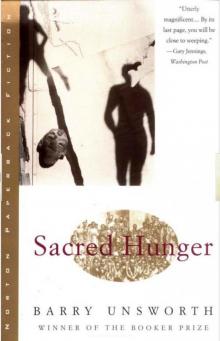 Sacred Hunger
Sacred Hunger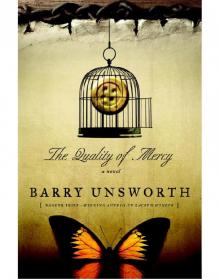 The Quality of Mercy: A Novel
The Quality of Mercy: A Novel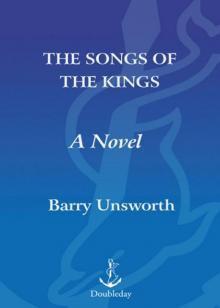 The Songs of the Kings: A Novel
The Songs of the Kings: A Novel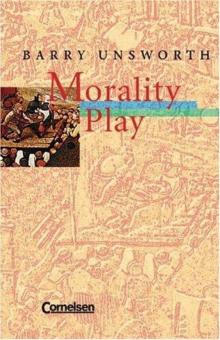 Morality Play. Mit Materialien. (Lernmaterialien)
Morality Play. Mit Materialien. (Lernmaterialien)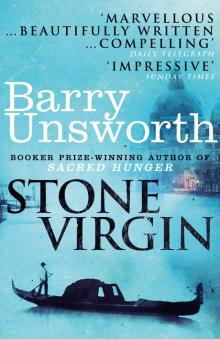 Stone Virgin
Stone Virgin Land of Marvels
Land of Marvels Mooncranker's Gift
Mooncranker's Gift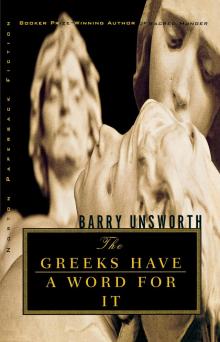 The Greeks Have a Word for It
The Greeks Have a Word for It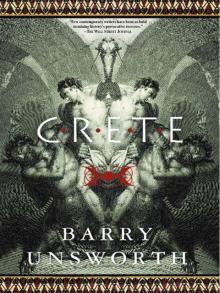 Crete
Crete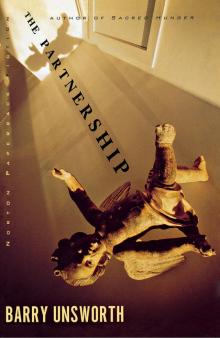 The Partnership
The Partnership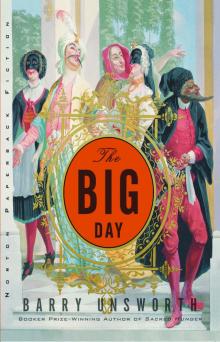 The Big Day
The Big Day The Hide
The Hide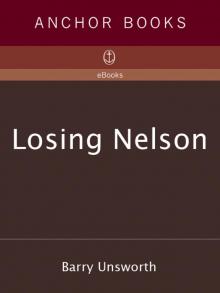 Losing Nelson
Losing Nelson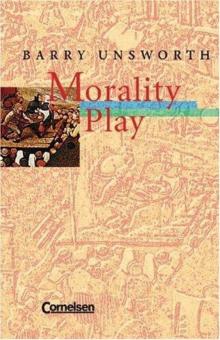 Morality Play
Morality Play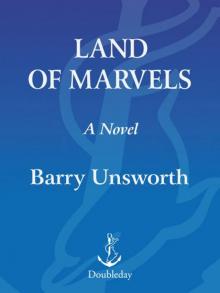 Land of Marvels: A Novel
Land of Marvels: A Novel The Ruby In Her Navel
The Ruby In Her Navel